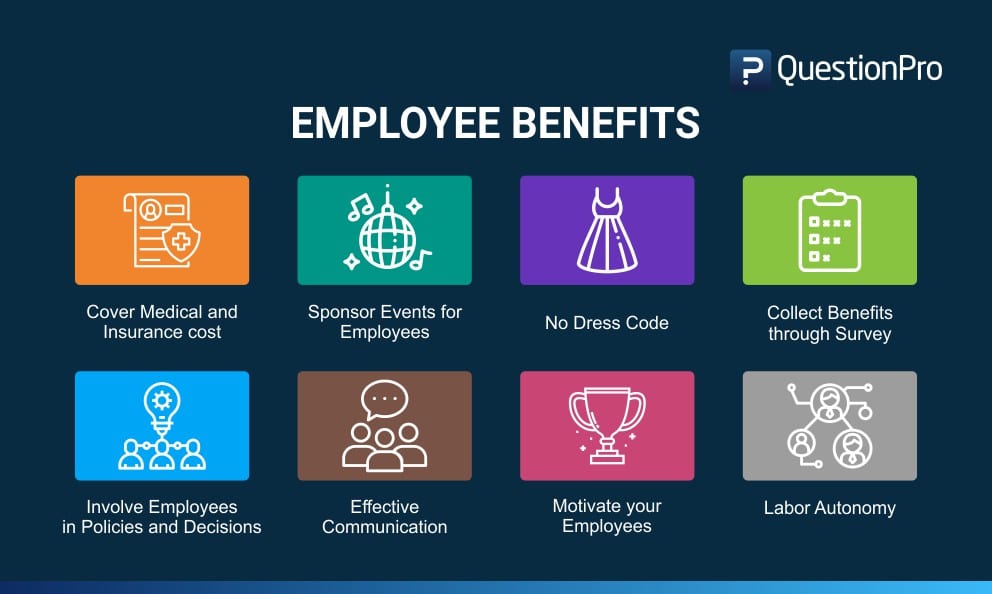Types of Employee Benefits
Employee benefits play a crucial role in attracting and retaining top talent in today’s competitive job market. A comprehensive benefits package not only enhances an organization’s overall compensation strategy but also contributes to employee satisfaction and overall well-being. In this article, we will explore the various types of employee benefits and their significance in the workplace.
Health and Wellness Benefits
One of the most important categories of employee benefits is health and wellness benefits. These benefits aim to support employees’ physical and mental well-being, promoting a healthy work-life balance. Some common health and wellness benefits include:
Medical insurance
Dental and vision insurance
Wellness programs
Employee assistance programs
Health savings accounts
By offering comprehensive health and wellness benefits, employers demonstrate their commitment to the overall well-being of their workforce, leading to increased employee satisfaction and productivity.
Retirement and Financial Benefits
Retirement and financial benefits are another crucial aspect of an employee’s compensation package. These benefits help employees plan for their future and provide financial security. Some common retirement and financial benefits include:
401(k) plans
Pension plans
Stock options
Profit-sharing programs
Employee stock purchase plans
By offering attractive retirement and financial benefits, employers can attract and retain top talent while ensuring their employees’ long-term financial stability.
Work-Life Balance Benefits
Work-life balance benefits have gained significant importance in recent years. These benefits help employees maintain a healthy equilibrium between their personal and professional lives. Some common work-life balance benefits include:
Flexible work schedules
Paid time off
Remote work options
Parental leave
Childcare assistance
By offering work-life balance benefits, employers foster a positive work environment, reduce employee burnout, and enhance overall job satisfaction.
Career Development Benefits
Career development benefits are essential for employees’ professional growth and advancement. These benefits demonstrate an employer’s commitment to investing in their employees’ skills and knowledge. Some common career development benefits include:
Tuition reimbursement
Professional development programs
Mentorship opportunities
Training and certification programs
Conferences and workshops
By offering career development benefits, employers not only enhance their employees’ skills but also foster a culture of continuous learning and growth within the organization.

Employee benefits are a crucial component of an organization’s overall compensation strategy. By offering a comprehensive benefits package, employers can attract and retain top talent, enhance employee satisfaction, and promote overall well-being. In this article, we explored the various types of employee benefits, including health and wellness benefits, retirement and financial benefits, work-life balance benefits, and career development benefits. By understanding the significance of each benefit category, employers can create a competitive edge in the job market and build a thriving and engaged workforce.
Employee Benefits FAQs
1. What are employee benefits?
Employee benefits are non-wage compensation provided to employees in addition to their regular salary or wages.
These benefits can include healthcare, retirement plans, paid time off, and other perks.
2. What are the different types of employee benefits?
The different types of employee benefits can include:
Health insurance
Retirement plans (such as 401(k) or pension)
Paid time off (vacation, sick leave, holidays)
Life insurance
Disability insurance
Flexible spending accounts
Employee assistance programs
Stock options or equity
Tuition reimbursement
Wellness programs
3. Are all employee benefits mandatory?
No, not all employee benefits are mandatory. While some benefits like Social Security and workers’ compensation
may be required by law, many other benefits are offered voluntarily by employers as part of their overall
compensation package.
4. How do employee benefits impact job satisfaction?
Employee benefits play a significant role in job satisfaction. When employees receive valuable benefits, they
feel more appreciated and motivated, leading to higher job satisfaction levels. Benefits can also attract and
retain top talent.
5. Can employee benefits be customized?
Yes, employers often offer customizable employee benefits packages. This allows employees to select the benefits
that best suit their individual needs, such as choosing between different healthcare plans or retirement
options.
6. Are employee benefits taxable?
Some employee benefits are taxable, while others may be tax-free. Benefits like health insurance premiums paid by
the employer is generally not taxable, while bonuses and stock options may be subject to taxation.
7. What is vesting about retirement benefits?
Vesting refers to the process by which an employee gains ownership of employer-contributed funds or benefits
over time. It ensures that employees who stay with a company for a certain period are entitled to
receive the full benefits of the retirement plan.
8. Can employee benefits be transferred to a new job?
Employee benefits are generally specific to the employer offering them. When changing jobs, employees may lose
certain benefits provided by their previous employer. However, some benefits like retirement plans can be rolled
over to a new employer’s plan or an individual retirement account (IRA).
9. How can employees find information about their benefits?
Employees can usually find information about their benefits in the employee handbook, through HR departments, or
by accessing the company’s intranet. Employers are responsible for providing clear and accessible information
about the benefits they offer.
10. Can employee benefits be adjusted or changed over time?
Yes, employee benefits can be adjusted or changed over time. Employers may modify benefit plans to keep up with
changing regulations, and economic conditions, or to better meet the needs of their workforce. However, any changes
should be communicated effectively to employees.




